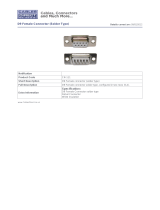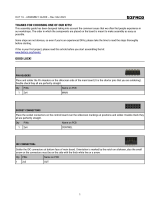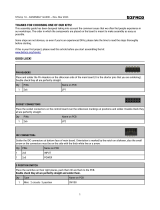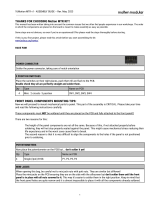Page is loading ...

last update: 20. 8. 2019
KOMPAS v1.2 - Assembly Guide
bastl-instruments.com
INTRODUCTION
This guide is for building KOMPAS module from Bastl Instruments. It is good to have basic soldering
skills and to be able to identify electronic components before starting this kit. However if you have
never soldered before, check out this tutorial first . We even included some of the best quality solder
1
to help you solder everything faster and better.
The KOMPAS kit consists of two boards. All the parts comes in three bags separated for Top board,
Bottom board and Assembly parts. See the Bill of Materials for detailed list.
1
https://cdn-learn.adafruit.com/downloads/pdf/adafruit-guide-excellent-soldering.pdf?timestamp=15596
28255
1

BILL OF MATERIALS
KOMPAS_V.1.2 BOM
qty
value
part
RESISTORS
15
1k
R-EU_0204/5
3
10k
R-EU_0204/5
6
100k
R-EU_0204/5
3
1M
R-EU_0204/5
CAPACITORS
3
100nF
ceramic capacitor
2
10uF
electrolytic capacitor
SEMICONDUCTORS
1
1N4007
DIODE-D-7.5
1
7805
voltage regulator
5
2N3904
NPN, BULK
1
MCP6004
IC - in foam
1
ATMEGA328-PU
IC - in foam
2

1
16mHz
resonator
2
100mA
fuse
HARDWARE
1
14 pin DIL
DIL socket - in foam
1
28 pin DIL
DIL socket - in foam
3
POT LIN B100k 20mm
linear potentiometer
8
PJ-301BMB
jack 3.5mm
1
27 pin
male
1
21 pin
female
2
2x5 pin
male
8
3 mm white
LED
ASSEMBLY
1
M3_11,5_II
spacer
1
M3_11_IA
spacer
8
jack nut
8
jack washer
3
M3_6_I
screw
2
M3_8_X
screw
1
3 mm
nut
3
knob
1
kompas_top
PCB
1
kompas_bottom
PCB
1
power cable
4
jumper
1
faceplate
1
allen key
BEFORE STARTING THIS KIT...
Before starting the kit, prepare the following tools:
● Soldering iron
● Multi-meter
● Flush cutters
● n2. hex screwdriver or allen key (enclosed with kit)
● Phillips screwdriver
● Wrench No. 8
● Protective eyewear
● Isopropyl alcohol + smaller and clean brush (optional)
We suggest that you work in a clean, well lit and ventilated environment to avoid accidents or losing
any of the small components. Also go through this guide briefly and make sure that you understand all
the steps before you start soldering.
3

BOTTOM BOARD
RESISTORS
Start with the bottom board parts. First of all, take your time and check the values of all resistors
using the multimeter (or you can check the color codes if you are seasoned enough): 1k (7x), 10k
2
(3x), 100k (6x).
Then solder them on the bottom PCB to their spot and snip the leads close to the PCB - the joints
need to stay there, just cut off the wires (be sure to make this step on all remaining leads in the
course of this guide).
DIODE
Move to the diode (1N4007). Be careful, diodes are polarized! Make sure that the marking ring on
the diode body matches the marking on the circuit board (check out the photo below).
2
https://learn.sparkfun.com/tutorials/how-to-use-a-multimeter/measuring-resistance
4

MALE HEADERS
Solder the male pinheaders now (one 6 pins and two double 5 pins). Be careful to solder them
straight. This part could be tricky: you may first solder just one of the pins, take the board in your hand
and reheat that pin while pressing down on the header to align it (be careful, you don’t want to touch
the pin that you are heating up). Wait for it to cool and solder the rest of the pins.
IC SOCKETS
Solder both IC sockets (14 pin and 28 pin). Make sure that the notch on the socket matches the
print on the board.
5

CERAMIC CAPACITORS
Let’s do the 100nF ceramic capacitors now. There are three of them (marked “104” on itself).
VOLTAGE REGULATOR
Proceed to the 7805 voltage regulator. Bend its legs close to the body first. Insert it then to the spot
and make it lay on the PCB.
6

TRANSISTORS
Add two transistors (2N3904). Just be aware of the right orientation. Also don’t try to push these
parts on the board as you can see on the photo.
7

ELECTROLYTIC CAPACITORS
Let’s do the electrolytic caps (2x 10μF). These ones are polarized! There is a plus (+) sign on the
PCB that has to match the longer lead of the electrolytic capacitor (actually the minus (–) side is also
marked on the body of the capacitor with a white strip).
FUSES
Fuses look quite similar to capacitors so don’t let it confuse you. Solder two fuses right into the
rectangular spot signed “100mA” and ptc sign.
8

RESONATOR
Insert also the resonator (the orange component with 3 leads). This part is not polarized so you can
insert it in any direction.
INSERTING ICs
Next don’t forget to place ICs into the sockets (1x MCP6004, 1x Atmega). There is a notch on each
IC that should match with the notch on the socket. Installing ICs can be also a little tricky. You
should bend the IC leads in slightly with your fingers. Then press all the leads into the sockets in one
shot.
FEMALE HEADERS
As you can see the female pinheaders left. Hold on with these parts. You will use them in later
steps.
For now you are done with the bottom board. Make the last check that all parts are on the right place
and everything is properly soldered.
9

TOP BOARD
RESISTORS
Let's move to the top PCB now. Again, start with the resistors: 1k (8x), 1M (3x). You are going to
place them from both sides of the PCB. Just be sure that the legs are properly cut so they are not
going to be touched with the jacks.
TRANSISTORS
Add next three transistors (2N3904). Again: keep in mind the orientation and don’t push the
transistors absolutely down to the PCB.
10

PINHEADERS
Now it’s time to connect the boards with pinheaders:
1) Mount the spacer (nut x nut) with the screw to the bottom board first.
2) Insert male headers into the female ones.
3) Put the headers on the bottom board facing the female ones down.
4) Place the top board on and secure it with the other spacer. Check the position and do the
soldering of headers finally.
11

12

JACK CONNECTORS, POTENTIOMETERS & LEDS
You are almost done. Let's do the rest of the components by just putting them in first (no soldering
yet! It starts at point 7):
1) Unmount the top board. Unmount the spacers.
2) Mount the spacer (nut x screw) to the faceplate first.
3) Insert the potentiometers (3x) on the board. Be sure they’re placed in the right angle and
they’re right on the board.
13

4) Insert the white LEDs - watch out for orientation! (the longer lead has to go into the plus (+)
hole signed on PCB).
5) Insert jack connectors (8x).
6) Place the faceplate on and mount few jacks with nuts. Add the spacer too.
14

7) Check the position of all the parts if they are flat on the board and at the right angle, push the
LEDs to the faceplate and do the soldering - for LEDs solder just one leg of each first, align
them then to the faceplate. - LEDs (one leg) + pots + jacks
(
SOLDERING TIP
: you can start by soldering just one of the leg at each component so you
can make adjustments easier by reheating)
CLEANING (OPTIONAL) & FINAL CHECK
After the soldering is done you might want to clean your PCB. You can use e.g. isopropyl alcohol.
Spread some of the liquid all over the PCB using the brush (be aware to not let it flow into the
potentiometers!), let it act for a few seconds and sweep it off. Then just let it dry. You can repeat these
steps until you are satisfied with the result.
15

This is also a right time to check the boards if everything is placed and soldered properly.
16

FINAL ASSEMBLY
Congratulations! You have made it through. Now just put the boards back together, put the faceplate
on (secured by the screw and nuts with washers) and your KOMPAS is ready to work! Oh and don’t
forget to put the knobs and jumpers on (the led0
, led1
, led2 positions; 4th jumper must be left
unconnected for default operation - see picture).
Before you connect anything, make sure that your system is disconnected from power. Also double
check the polarity of the ribbon cable, the red cable should match the -12V rail both on the module
and on the bus board!
TROUBLESHOOTING
If you have any issues with the module, please check the F.A.Q. at our website first. You can reach us
(available at https://noise.kitchen).
17
/







